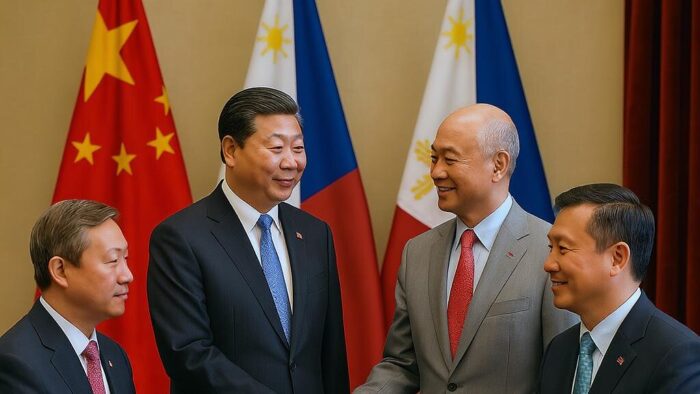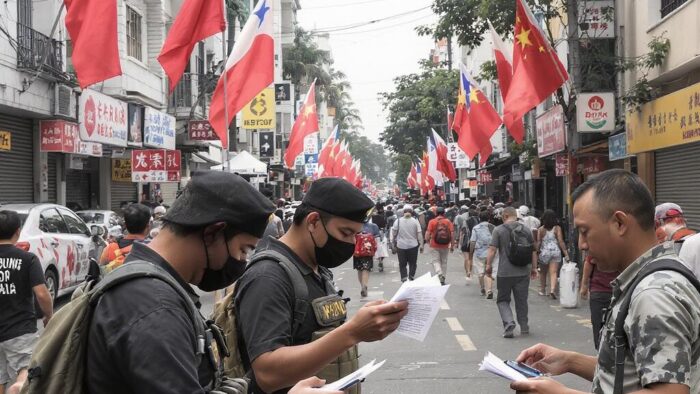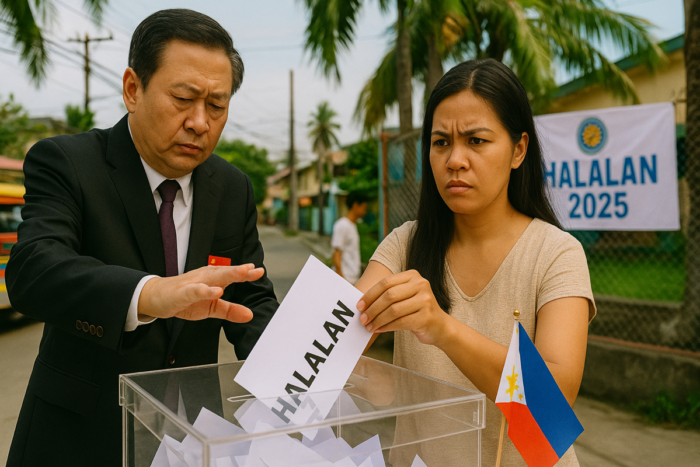China hired a Philippine marketing firm that ran fake social media accounts to weaken support for Philippine government policy and sow discord over Manila’s security alliance with the United States, according to internal documents and interviews with former employees. On 6 October 2025, Reuters reported that InfinitUs Marketing Solutions, a Chinese-owned company based in Manila, waged a cyber campaign paid for by the Chinese embassy using fake Facebook profiles to amplify anti-American content and disparage Western-made COVID vaccines. The article begins:
As Chinese ships fired water cannons at Philippine vessels in the South China Sea in November 2021, Beijing’s then-ambassador to Manila asked Filipinos on Facebook to share their favorite things about China. Among the hundreds of gushing responses were three from a young man named “Vince Dimaano.” His comments — like many responding to the Chinese embassy’s posts — weren’t genuine. They came from fake accounts paid for by the diplomatic mission, according to internal documents from a Manila-based marketing agency. The firm, InfinitUs Marketing Solutions, waged a cyber campaign paid for by China to weaken support for Philippine government policy and to sow discord over Manila’s security alliance with the United States, according to a review of the documents and the fake Facebook accounts, as well as interviews with two former company employees and two Philippine officials.
Key Points
- InfinitUs Marketing Solutions created what it called an army of at least ten fake Facebook accounts that propagated content about the cons of US Typhon missiles being deployed in the Philippines, according to company work-progress reports.
- The Chinese-owned company also created Ni Hao Manila, a media outlet designed to appear Filipino-run, which posted videos highlighting Beijing’s naval prowess and criticizing Philippine security cooperation with the United States.
- The Chinese embassy distributed cash awards ranging from approximately $850 to $3,440 to dozens of prominent Filipinos through the Association of Philippine-China Understanding, an organization re-established by former Philippine President Gloria Arroyo and a Chinese Communist Party agency.
- Meta confirmed the fake accounts violated platform policy and removed them after being alerted by Reuters, while TikTok investigated Ni Hao Manila’s account and removed fake followers after being notified by the news agency.
China’s Influence Operations in the Philippines: Disinformation, Election Interference, and Soft Power
Chinese influence operations in the Philippines have escalated into a comprehensive assault on democratic institutions through espionage, election interference, economic coercion, and sophisticated disinformation campaigns targeting America’s oldest Southeast Asian ally. Since January 2025, Philippine authorities arrested more than a dozen Chinese nationals on espionage charges after they infiltrated local communities bearing gifts of cash for poverty relief and motorcycles for police officers while covertly mapping military bases, photographing coastguard vessels, and surveying power plants. Internal documents from Manila-based marketing firm InfinitUs Marketing Solutions reveal that the Chinese embassy directly financed fake Facebook and X accounts spreading anti-American and pro-China narratives, deploying “keyboard warriors” to promote agendas counter to Manila’s South China Sea claims and undermine the U.S.-Philippine security alliance.
Beijing has weaponized sister city arrangements and economic dependencies as strategic footholds for influence. China transformed cultural exchanges in Palawan and Cagayan provinces into instruments of political leverage, with the Cagayan Economic Zone Authority attracting $140 million in foreign capital since 2011, primarily from China, creating economic dependencies that shape local politics near Taiwan. The Communist Party simultaneously cultivates the Filipino-Chinese diaspora through United Front Work Department operations, using ancestral connections as leverage points while pressuring businesses like the Filipino-Chinese conglomerate Puregold to cancel screenings of documentaries exposing Chinese obstruction of Filipino fishermen, demonstrating Beijing’s ability to constrain free expression through economic intimidation.
Digital disinformation represents the most insidious dimension of Chinese operations. Approximately one-third of pro-Duterte accounts on X were fake, according to tech analysis firm Cyabra, with these inauthentic networks amplifying content from propaganda sites and state media while attacking President Ferdinand Marcos Jr. Philippine National Security Council officials confirmed indications of Chinese state-sponsored information operations attempting to prop up preferred candidates while undermining others, with pro-Duterte candidates winning five of twelve open Senate seats in May 2025 elections. Deepfake content specifically targeted Marcos, including viral audio supposedly authorizing military attacks against China and video showing alleged drug use—both flagged as fake by the government but demonstrating how AI-generated content amplifies political divisions while advancing Beijing’s territorial ambitions in contested waters.
The operations deploy coordinated social media manipulation through fake personas and content-sharing agreements with local outlets that amplify pro-China narratives while marginalizing critical voices. Research by Doublethink Lab identified networks posting pro-Duterte and anti-Marcos content while simultaneously boosting pro-China material, illustrating how Beijing exploits domestic political feuds to advance strategic interests. These campaigns mirror tactics used against Taiwan, with the Philippines serving as what analysts describe as a “petri dish” for disinformation experiments that combine economic pressure, diaspora cultivation, and digital manipulation to reshape political environments—a comprehensive strategy that threatens not only Philippine sovereignty but democratic processes throughout the Indo-Pacific region.
External References:
— China Is Testing Out Disinformation in Philippine Elections — Foreign Policy
— Philippine Authorities Call Out Alleged Chinese Election Interference — The Diplomat
— How China waged an infowar against U.S. interests in the Philippines — Reuters
Disclaimer:
The Global Influence Operations Report (GIOR) utilizes AI throughout the posting process, including the generation of summaries for news items, introductions, key points, and, often, the “context” section. We recommend verifying all information before use. Additionally, all images are generated using AI and are intended solely for illustrative purposes. While they represent the events or individuals discussed, they should not be interpreted as real-world photography.











